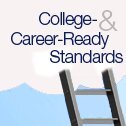UPDATED
A new organization is wading into the (very choppy) waters of judging whether major textbooks and other classroom materials are aligned to the common core.
The long-rumored edreports.org now has an executive director—Eric Hirsch, formerly the chief external affairs officer at the New Teacher Center—as well as a mission statement and a basic up-and-running website. The nonprofit is billing itself as “a ‘Consumer Reports’ for school materials.” But unlike Consumer Reports, it will offer its services for free.
According to the website, the organization will officially launch this winter, and will begin by reviewing K-8 mathematics materials. From there, it will move on to secondary math and K-12 English/language arts curricula.

The organization joins several others that are vetting instructional materials for alignment to the Common Core State Standards. Achieve, the nonprofit that played a key role in launching the common-standards initiative, created EQuIP, which evaluates the alignment of units and lessons to the common standards (it’s not currently being used to vet the work of the big publishers). Learning List, a for-profit company, analyzes digital and print educational resources for common-core alignment, but charges for access.
In addition, about 20 states convene panels to develop “adoption lists,” which determine the instructional materials districts can choose from.
Some organizations have taken a different tack, producing alignment tools that educators and others can use to judge how well materials reflect the common core. One example is Student Achievement Partners, whose founders led the writing of the common standards. The group has posted tools for determining common-core alignment online.
As edreports.org says on its website, Maria M. Klawe, the president of Harvey Mudd College, will lead the group’s board of directors. (We reported to you way back in February that Klawe was helping get the group started.) Education First will provide programmatic support through the fall, the site says.
As for the review team, that will consist of “19 experienced educators, including 10 practicing teachers and 9 instructional leaders.”
We’ll keep readers apprised as the group releases more specifics.
(This blog post was updated to clarify the type of support being provided by Education First.)
